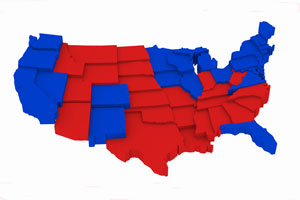Wisconsin was the site of a recent four-day trial challenging the way that its legislative districts were drawn after the 2010 census. The plaintiffs in this case are a group of twelve Democratic voters who claim that Wisconsin’s state assembly map was drawn to dilute their vote. The lead plaintiff is Bill Whitford, a retired University of Wisconsin Law Professor.
Gerrymandering
Stanford University political science and statistic professor Simon Jackman testified for the Democratic plaintiffs that, if the Republican-drawn legislative map is allowed to stand, the Republicans are “virtually 100 percent” certain to retain a majority in the Wisconsin Assembly. Jackman reviewed 786 elections and 206 redistricting plans throughout the United States from 1972 and 2014 and found only four plans with a stronger pro-Republican gerrymander.
Part of Jackman’s analysis was based upon the new “efficiency gap” test. This test was created by Nicholas O. Stephanopoulos and Eric M. McGhee, professors of political science at the University of Chicago, to measure partisan gerrymanders. Stephanopoulos has worked with the plaintiffs in this case. Stephanopoulos and McGhee assert that the efficiency gap test is an objective judicial standard to evaluate whether a district map creates a gerrymander.
The efficiency gap looks at the percentage of each party’s votes that are wasted on races where their candidates lose. A higher efficiency gap score means a larger gerrymander. According to Jackman, the efficiency gap showed that Wisconsin’s current legislative map is more gerrymandered than any other in recent state history. The current map had a score of 13 percent in the 2012 election and 10 percent in 2014. In comparison, the maps from the 1980s and 1990s had low efficiency gap scores of approximately two percent.
The Democrats contended that the efficiency gap is a way to measure unconstitutional partisan gerrymanders designed to give an extreme and durable advantage to one party. In Davis v. Bandemer, the U.S. Supreme Court upheld an Indiana law that redrew state districts but said that redistricting is properly justiciable and could be held unconstitutional if it was “arranged in a manner that will consistently degrade a voter’s or a group of voters’ influence on the political process as a whole.”
The Wisconsin Case
Arguing for the state, Assistant Attorney General Brian Keenan, defended the maps and attacked the validity of the efficiency gap model. Keenan contended that the efficiency gap’s numbers are not reliable and do not accurately consider the demographic and voting patterns in the state.
The case was heard by a panel of three judges: Senior Judge Kenneth Ripple of the 7th Circuit U.S. Court of Appeals in Chicago, U.S. Chief Judge William Griesbach of Milwaukee and U.S. District Judge Barbara Crabb of Madison. Each party will have two weeks to file their final brief and ten additional days to file responses.
In a study published by the Washington Post, a group of political science professors and students from Binghamton University, Jonathan Krasno, Daniel Magleby, Michael D. McDonald, Shawn Donahue and Robin Best, independently concluded that the Democratic plaintiffs’ case is strong. The academic group checked for bias by comparing the mean and median two-party vote in Wisconsin’s 99 assembly voting districts in statewide elections. This study found that the way that the voting districts were drawn favored Republican voters by between 3.8 to 6.3 percentage points in every statewide election from 2008 to 2014.




